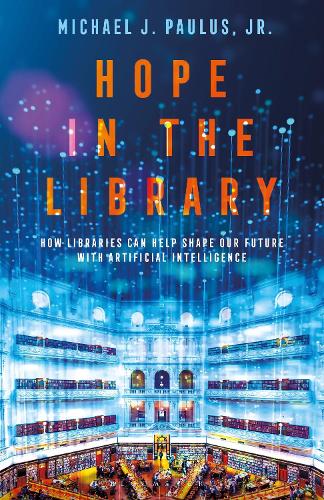
Hope in the Library: How Libraries Can Help Shape Our Future with Artificial Intelligence
(Hardback)
Available Formats
Publishing Details
Hope in the Library: How Libraries Can Help Shape Our Future with Artificial Intelligence
By (Author) Dr. Michael J. Paulus
Bloomsbury Publishing USA
Bloomsbury Publishing USA
2nd April 2026
United States
Classifications
Tertiary Education
Non Fiction
Impact of science and technology on society
Artificial intelligence (AI)
Media studies: internet, digital media and society
Biography, Literature and Literary studies
Physical Properties
Hardback
192
Width 140mm, Height 210mm
Description
What is the role of the library in an increasingly complex information environment filled with and redesigned for artificial intelligence
Hope in the Library presents a compelling case for the continued relevance of libraries in an age increasingly shaped by artificial intelligence. Michael J. Paulus, Jr., shows how libraries, as human-centered and human-scaled institutions, have enduring roles as archives for reflection and understanding, sites of imagination and hope, and catalysts for human agency. This book argues that, by providing an essential counterbalance to impersonal and automated systems, libraries are essential for not only surviving but thriving in our emerging information environment.
Hope in the Library is structured as a series of essays organized by explorations of the library in the past, in imagined futures, and in our digitally-enhanced present. The book can be read a few different ways: from beginning to end; following topical pathways suggested in the final section; or in any other order chosen by the reader. Each essay and section, like a book or section of a library, may be read independently. Informed by over two decades of leading and studying libraries, these essays include the authors professional as well as personal reflections and encourage a more radical reframing of how AI may be integrated into libraries and society to help create a better future.
Author Bio
Michael J. Paulus, Jr., is University Librarian at Creighton University, USA, and was previously Dean of the Library, Assistant Provost for Educational Technology, and Associate Professor of Information Studies at Seattle Pacific University. He is the author of Artificial Intelligence and the Apocalyptic Imagination: Artificial Agency and Human Hope (2023) and co-editor of AI, Faith, and the Future: An Interdisciplinary Approach (2022).
